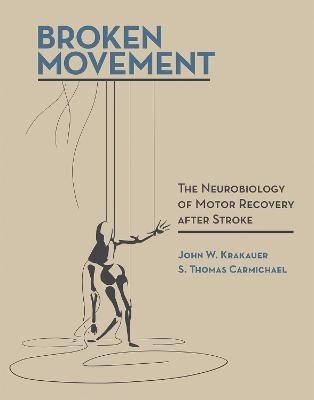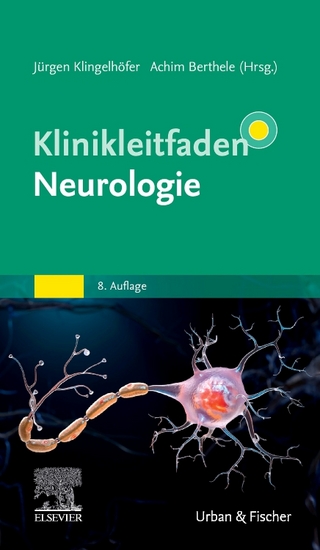
Broken Movement
The Neurobiology of Motor Recovery after Stroke
Seiten
2017
MIT Press (Verlag)
978-0-262-03722-8 (ISBN)
MIT Press (Verlag)
978-0-262-03722-8 (ISBN)
- Titel ist leider vergriffen;
keine Neuauflage - Artikel merken
An account of the neurobiology of motor recovery in the arm and hand after stroke by two experts in the field.
Stroke is a leading cause of disability in adults and recovery is often difficult, with existing rehabilitation therapies largely ineffective. In Broken Movement, John Krakauer and S. Thomas Carmichael, both experts in the field, provide an account of the neurobiology of motor recovery in the arm and hand after stroke. They cover topics that range from behavior to physiology to cellular and molecular biology. Broken Movement is the only accessible single-volume work that covers motor control and motor learning as they apply to stroke recovery and combines them with motor cortical physiology and molecular biology. The authors cast a critical eye at current frameworks and practices, offer new recommendations for promoting recovery, and propose new research directions for the study of brain repair.
Krakauer and Carmichael discuss such subjects as the behavioral phenotype of hand and arm paresis in human and non-human primates; the physiology and anatomy of the motor system after stroke; mechanisms of spontaneous recovery; the time course of early recovery; the challenges of chronic stroke; and pharmacological and stem cell therapies. They argue for a new approach in which patients are subjected to higher doses and intensities of rehabilitation in a more dynamic and enriching environment early after stroke. Finally they review the potential of four areas to improve motor recovery: video gaming and virtual reality, invasive brain stimulation, re-opening the sensitive period after stroke, and the application of precision medicine.
Stroke is a leading cause of disability in adults and recovery is often difficult, with existing rehabilitation therapies largely ineffective. In Broken Movement, John Krakauer and S. Thomas Carmichael, both experts in the field, provide an account of the neurobiology of motor recovery in the arm and hand after stroke. They cover topics that range from behavior to physiology to cellular and molecular biology. Broken Movement is the only accessible single-volume work that covers motor control and motor learning as they apply to stroke recovery and combines them with motor cortical physiology and molecular biology. The authors cast a critical eye at current frameworks and practices, offer new recommendations for promoting recovery, and propose new research directions for the study of brain repair.
Krakauer and Carmichael discuss such subjects as the behavioral phenotype of hand and arm paresis in human and non-human primates; the physiology and anatomy of the motor system after stroke; mechanisms of spontaneous recovery; the time course of early recovery; the challenges of chronic stroke; and pharmacological and stem cell therapies. They argue for a new approach in which patients are subjected to higher doses and intensities of rehabilitation in a more dynamic and enriching environment early after stroke. Finally they review the potential of four areas to improve motor recovery: video gaming and virtual reality, invasive brain stimulation, re-opening the sensitive period after stroke, and the application of precision medicine.
John W. Krakauer is John C. Malone Professor and Professor of Neurology, Neuroscience, and Physical Medicine and Rehabilitation at the Johns Hopkins University School of Medicine. S. Thomas Carmichael is Professor and Chair and Frances Stark Endowed Chair in the Department of Neurology at the David Geffen School of Medicine at the University of California, Los Angeles, and Codirector of UCLA's Broad Stem Cell Center.
| Erscheinungsdatum | 29.01.2018 |
|---|---|
| Reihe/Serie | The MIT Press |
| Zusatzinfo | 35 b&w illus.; 70 Illustrations |
| Sprache | englisch |
| Maße | 178 x 229 mm |
| Themenwelt | Medizin / Pharmazie ► Medizinische Fachgebiete ► Neurologie |
| Naturwissenschaften ► Biologie ► Humanbiologie | |
| Naturwissenschaften ► Biologie ► Zoologie | |
| ISBN-10 | 0-262-03722-X / 026203722X |
| ISBN-13 | 978-0-262-03722-8 / 9780262037228 |
| Zustand | Neuware |
| Haben Sie eine Frage zum Produkt? |
Mehr entdecken
aus dem Bereich
aus dem Bereich
interdisziplinäre Diagnose- und Behandlungsstrategien
Buch | Hardcover (2024)
Urban & Fischer in Elsevier (Verlag)
CHF 135,75
Buch | Hardcover (2024)
Springer (Verlag)
CHF 195,95


